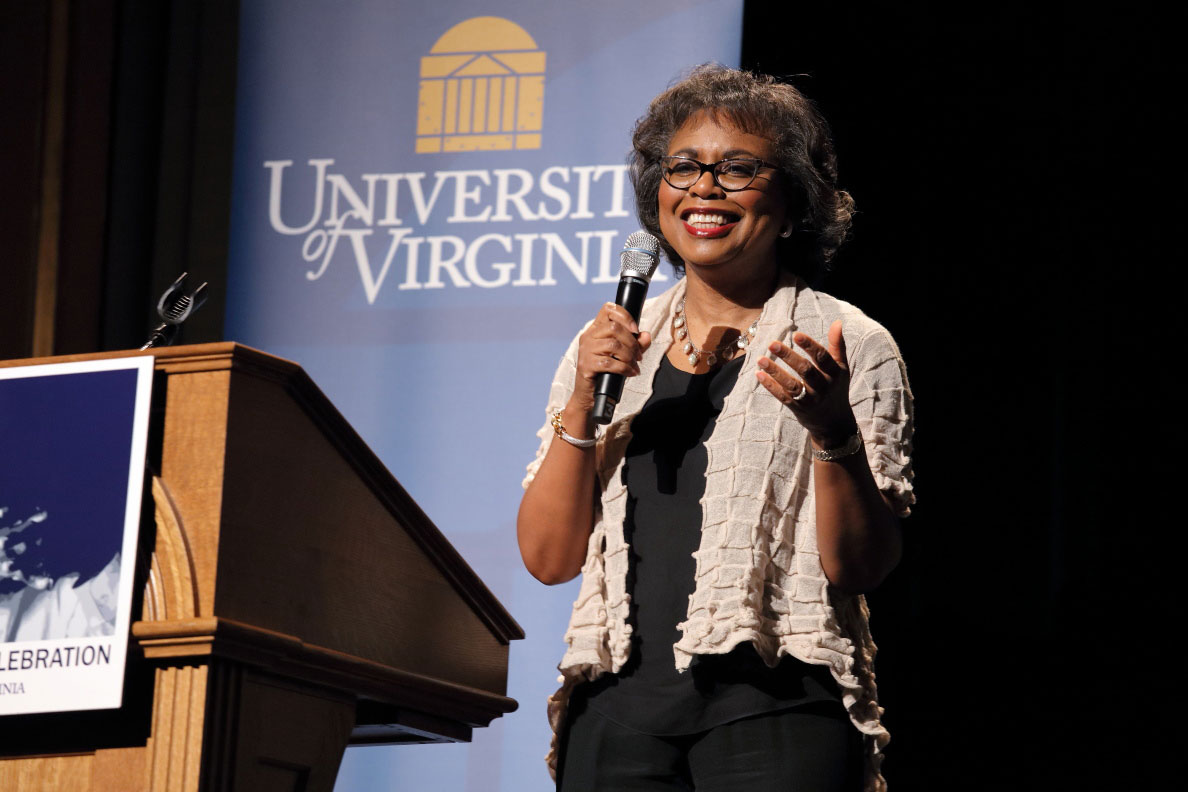Anita Hill has devoted her career to civil rights and women’s rights since those days in 1991 when she boldly testified about sexual harassment during U.S. Senate hearings for Supreme Court nominee Clarence Thomas.
Hill, for many years now a Brandeis University professor, spoke Thursday night to a packed Paramount Theater as the keynote speaker for the University of Virginia’s 2017 Community MLK Celebration to commemorate the life and legacy of the Rev. Dr. Martin Luther King Jr.
Hill discussed what happened 25 years ago and how it relates to what’s happening now with civil rights issues, outlining how people can move forward in working toward equality for all across gender, race and class lines.

After enjoying a public reception and music from the MLK Community Choir that convenes each year for several performances as part of the celebration, the audience of about 1,000 greeted Hill with a standing ovation.
“We are in a new day, a new reality – and it is reality,” she said.
Echoing this year’s Community Celebration “Silence as Betrayal” theme, drawn from one of King’s speeches, Hill declared, “We can’t remain silent.”
Although Thomas denied Hill’s sexual harassment allegations, she has stood by her description of events and has continued to work on a range of civil rights issues, among them workplace discrimination, through legal and public policy scholarship, public talks and multidisciplinary projects.
Hill described resources on three fronts – social, legal and political – that everyone can use to work on equality issues. They are more available and stronger today, she said, than when she faced the Judiciary Committee’s 14 white male senators during the Thomas confirmation hearings.
Hill noted that students in the audience who had not been born at that time might not have much of a concept of what the legal and cultural climate for women was like in the years before 1991. Although Title VII of the 1964 Civil Rights Act prohibited employers from discriminating against employees on the basis of sex, race, color, national origin and religion, sexual harassment was generally considered a personal issue and avenues for seeking justice had not been established. During the 1970s and ’80s, if women went to court, they didn’t know if their claims would be understood, said Hill, who is University Professor of Social Policy, Law and Women’s Studies at Brandeis.
After being subpoenaed, Hill went through a difficult interrogation about her experiences of sexual harassment as she worked for Thomas in two different jobs in less than three years. When he was affirmed for the court, many thought that would silence women coming forward about sexual harassment, she said.
“They counted on fear and division keeping us quiet,” she said. “Does that sound familiar?”
The opposite happened. Women started coming forward and the number of workplace complaints to the Equal Employment Opportunity Commission doubled a year later.
It is still important for those who are discriminated against or who are facing sexual harassment to share their stories, Hill said. She urged individuals to tell their families, friends and others the stories they might have held secret. It can be liberating, she said, as well as informing people of the real harm sexual harassment causes.
She credited students at colleges and universities for speaking out about sexual assault, too, and showing “there is no bright line between sexual harassment and sexual assault.”
Litigation will still be a necessary route, although not every case will be won. Policymaking has made a difference, she said. The biggest change in the current climate is that many businesses and college campuses have become institutional partners, willing to invest efforts to protect equal rights in their settings – notwithstanding cases like Bill Cosby’s and Roger Ailes’s, she said.
Turning to politics, Hill reminded the audience that elections on the federal level come every two years. She also mentioned that working on state and local levels often then spurs national action.
She recalled that at stake in Thomas’ confirmation hearing – before she even became part of the picture – was the future of civil rights laws that Thomas’ predecessor on the Supreme Court, Thurgood Marshall, had fought for in the courts. Marshall, the Supreme Court’s first African-American justice, understood systemic racism and implicit bias, Hill said. Thomas thought the government had gone too far and believed black people should be self-reliant.
Hill said the 1991 hearing serves as a 20th-century morality play. It became a public referendum not just on sexual harassment in the workplace, but about a whole host of related issues, including race and gender.
“What do we do today when there seems to be indifference to sexual harassment and other civil rights?” asked Hill, who has published “Speaking Truth to Power” and “Reimagining Equality: Stories of Gender, Race and Finding Home.”
We have to be willing to punish perpetrators, she said, to immediate applause. “We should never accept ‘This is just what men do.’ It’s not like leaving the toilet seat up. It’s not trivial. It’s predatory behavior, and we must call it what it is. … It’s about power and it’s abuse.”
Fighting it is not easy. Race and gender alliances have complicated histories, her own case being a primary example, she said.
Nevertheless, she said she remains hopeful after all the positive changes that have been made.
“I hope you will commit to doing what you can to help make sure everyone’s rights are protected, to work on equal rights for all.”
Media Contact
Article Information
January 27, 2017
/content/we-cant-remain-silent-anita-hill-speaks-civil-womens-rights

